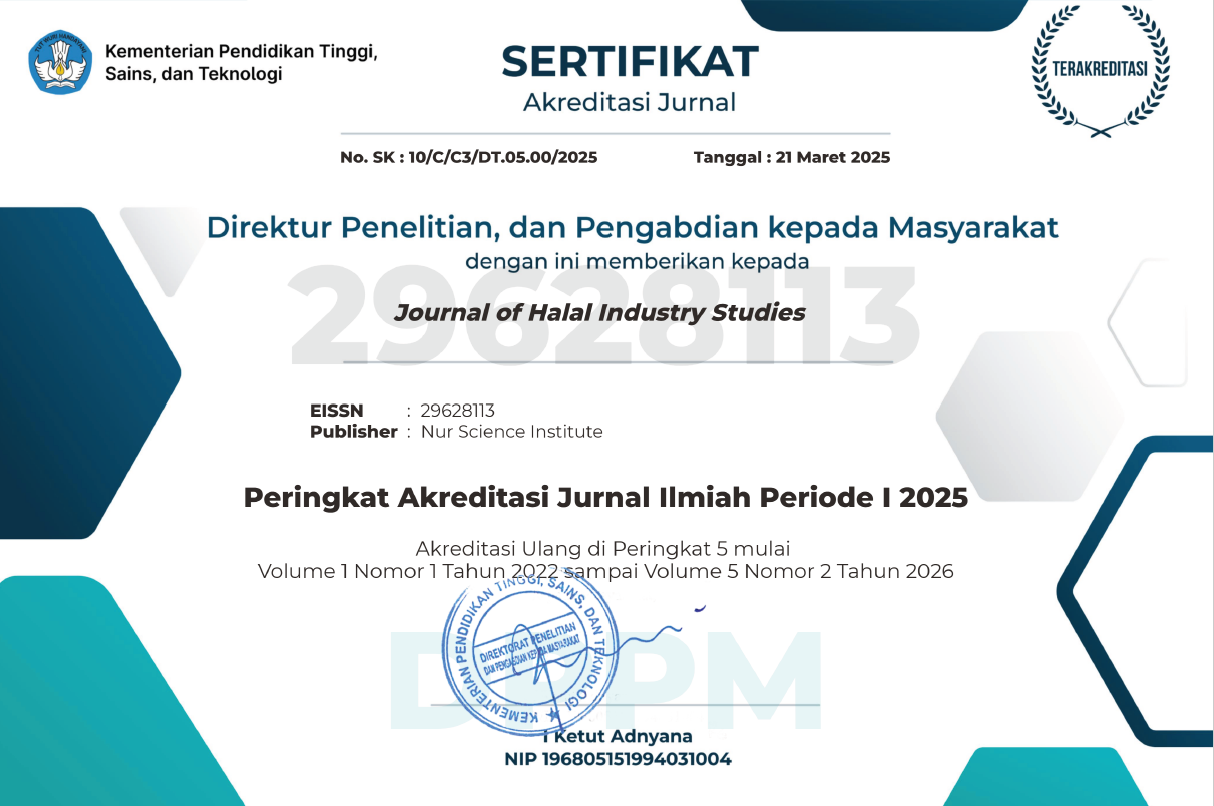Perspective of quranic verses of business ethics on justice and honesty in trade
DOI:
https://doi.org/10.53088/jhis.v3i2.1396Keywords:
Business ethics, Fairness, Honesty, Digital CommerceAbstract
This study examines the concept of business ethics from an Islamic perspective, highlighting two key principles: justice (adl) and honesty (siddiq), which are pertinent in addressing modern trade challenges. The digital era presents various issues, such as information manipulation and transparency concerns, often disadvantaging consumers. Employing a qualitative descriptive approach, the research utilizes thematic interpretation of Quranic verses, including QS. Al-Baqarah [2]: 282 and QS. Al-Mutaffifin [83]: 1-3, to explore how these principles can be applied in contemporary business ecosystems. The findings reveal that implementing justice and honesty strengthens consumer trust, enhances customer loyalty, and supports business objectives. The study proposes recommendations, including the integration of Islamic ethical values into digital business operations, strengthening of government regulations, improvement of Islamic financial literacy, and public education initiatives.
References
Adri, A., Azharah, S. L., Prawira, A. R., & Alfin, A. (2024). Konsep Dasar Operasional Manajemen Syariah dan Problematika serta Teknik Analisisnya. Indonesian Research Journal on Education, 4(4), 1601-1609.
Adrai, R., & Perkasa, D. H. (2024). Penerapan etika bisnis dan tanggung jawab sosial perusahaan dalam international human resources management. Jurnal Manajemen Dan Bisnis Madani, 6(2), 68-85.
Al-Ghazali, A. H. M. (1993). al-Mustasfa. Beirut: Dar al-Kutub al-‘Ilmiyyah.
Ali, M. H., & Suleiman, N. (2016). Sustainable food production: Insights of Malaysian halal small and medium sized enterprises. International Journal of Production Economics, 181, 303-314.
Amartya, S. (1999). Development as Freedom. Inggris: Oxford University Press.
Creswell, J. W. (2009). Research design: Qualitative, quantitative, and mixed methods approaches (3rd ed.). Sage Publications, Inc.
Fadilah, N. (2021). Karakteristik Dan Rancang Bangun Ekonomi Islam. SALIMIYA: Jurnal Studi Ilmu Keagamaan Islam, 2(4), 1-20.
Global Financial Integrity. (2023). Global Financial Integrity. https://gfintegrity.org/.
Hamid, A. M. (2024). Tata Kelola Keuangan Islam pada Sekolah Islam. Academia Publication.
Hanzaee, K. H., & Ramezani, M. R. (2011). Intention to halal products in the world markets. Interdisciplinary Journal of research in Business, 1(5), 1-7.
Herman, R. T. (2024). Urgensi Penerapan Praktik Etis: Efek Kepercayaan Konsumen dalam Mendukung Pertumbuhan Usaha Berkelanjutan. Jurnal Moral Kemasyarakatan, 9(1), 184-191.
Hidayati, Dian, Muhammad Iqbal Fasa, and Is Susanto. 2024. “Pengaruh Pemasaran Syariah Terhadap Kepercayaan Di Bank Syariah.” JICN: Jurnal Intelek Dan Cendikiawan Nusantara 1 (5)
IdEA - Indonesian E-Commerce Association. (2023). Accessed November 28, 2024. https://idea.or.id/home
Rawls, J. (1971). A Theory of Justice. Amerika Serikat: Harvard University Press.
Kusuma, K. A. (2023). Buku ajar pengantar bisnis digital dalam perspektif Islam. Umsida Press, 1-168.
Bank Indonesia (2023) Laporan Kelembagaan Bank Indonesia 2023.Accessed November 28, 2024. https://www.bi.go.id/id/publikasi/laporan/Pages/LKBI-2023.aspx.
Mas' ut, M. U., Mustofa, M. S., Dianto, A. Y., & Udin, M. F. (2023). Model Manajemen Resiko pada Lembaga Keuangan Syariah. Indonesian Journal of Humanities and Social Sciences, 4(3), 725-740.
Miles, M. B., & Huberman, A. M. (2014). Qualitative data analysis: A methods sourcebook. Sage Publications.
Mu’min, M. D. N. A., & Muin, R. (2024). Telaah Konsep Green Economic dalam Implementasi Etika Bisnis Islam. Journal of Management and Innovation Entrepreneurship (JMIE), 1(4), 786-795.
Muzakki, Z. (2023). Integrasi ilmu ekonomi Islam dan pendidikan agama Islam era society 5.0. Islamic Banking & Economic Law Studies (I-BEST), 2(1), 51-74. https://doi.org/10.36769/ibest.v2i1.327
Nasuka, M. (2020). Konsep Marketing Mix Dalam Perspektif Islam: Suatu Pendekatan Maksimalisasi Nilai. BISEI: Jurnal Bisnis Dan Ekonomi Islam, 5(01), 27-46.
Nasutio, S. B. A., & Siregar, M. F. (2024). Kedudukan Hukum Pemegang Polis Asuransi dan Tanggung Jawab Moral dan Hukum Perusahaan Asuransi terhadap Konsumen. Innovative: Journal Of Social Science Research, 4(3), 16565-16582.
Permana, Y., & Nisa, F. L. (2024). Konsep Keadilan Dalam Perspektif Ekonomi Islam. Jurnal Ekonomi Syariah Darussalam, 5(2), 80-94.
Prayuti, Y. (2024). Dinamika perlindungan hukum konsumen di era digital: Analisis hukum terhadap praktik e-commerce dan perlindungan data konsumen di Indonesia. Jurnal Interpretasi Hukum, 5(1), 903-913.
Rosyidah, E., & Rofiah, K. (2024). Etika bisnis Islam: Pendekatan siklus ekonomi dan praktik bisnis syariah dalam ekspansi waralaba industri retail. Jurnal Syntax Admiration, 5(5), 1438-1454.
Sain, M., & Bahri, S. (2024). Ekonomi Islam sebagai Landasan Fundamental dalam Praktik Bisnis Online Era Digital. El-Kahfi| Journal of Islamic Economics, 5(02), 203-218.
Santoso, R. P., Irawati, W., & Laili, C. N. (2024). Literature Review: Implementasi Strategi Relationship Marketing Dalam Meningkatkan Kinerja Manajemen Pemasaran. BIMA : Journal of Business and Innovation Management, 6(3), 409–416. https://doi.org/10.33752/bima.v6i3.6739
Sudrajat, M. R., & Hanifa, Z. (2023). Persaingan Usaha Sehat Dapat Membangun Ekosistem Bisnis Yang Berkelanjutan. Karimah Tauhid, 2(4), 1041-1048.
Sulaiman, N., & Yusuf, H. (2024). Strategi Penanggulangan Tindak Pidana Perpajakan di Indonesia: Studi Tentang Penghindaran dan Penggelapan Pajak. Jurnal Intelek Insan Cendikia, 1(9), 5124-5139.
Syahbudi, M., Zein, A. W., Al-Hafidh, M. N., Barus, E. E., & Ichsan, R. N. (2024). Literasi produk halal dalam rangka meningkatkan pemasaran pada UMKM di Deli Serdang. Jurnal Pengabdian Masyarakat Hablum Minannas, 3(1)
Tieman, M., Van der Vorst, J. G., & Che Ghazali, M. (2012). Principles in halal supply chain management. Journal of Islamic Marketing, 3(3), 217-243.
Zulhikam, A., Parmitasari , R. D. A., Abdullah, M. W., & Rofiah, I. (2024). Filosofi Prinsip Keuangan Islam Dan Implikasinya Pada Perbankan Syariah. Neraca: Jurnal Ekonomi, Manajemen Dan Akuntansi, 2(1), 273–283. https://doi.org/10.572349/neraca.v2i1.579
Downloads
Published
How to Cite
Issue
Section
License
Copyright (c) 2024 Khoirudin Khoirudin, Adnan Azzaki

This work is licensed under a Creative Commons Attribution-ShareAlike 4.0 International License.
Authors who publish with this journal agree to the following terms:
The author(s) retain copyright and grant the journal the right of first publication with the work simultaneously licensed under a CC BY-SA 4.0 license that allows others to remix, adapt, and build upon the work even for commercial purposes, as long as they credit the author(s) and license their new creations under the identical terms.
License details: https://creativecommons.org/licenses/by-sa/4.0/


